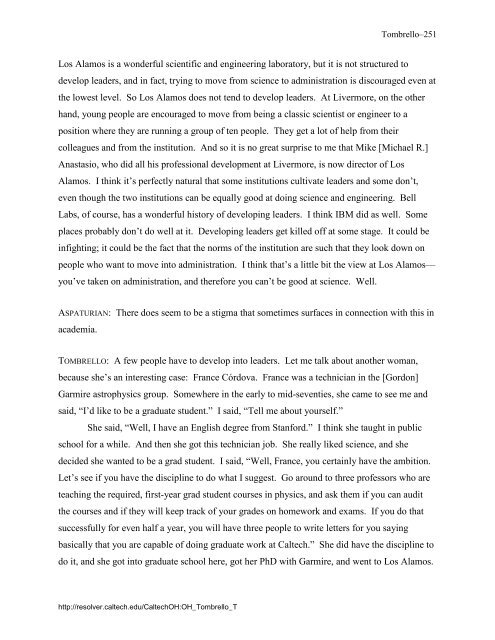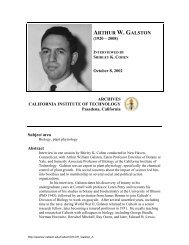Interview with Thomas A. Tombrello - Caltech Oral Histories
Interview with Thomas A. Tombrello - Caltech Oral Histories
Interview with Thomas A. Tombrello - Caltech Oral Histories
Create successful ePaper yourself
Turn your PDF publications into a flip-book with our unique Google optimized e-Paper software.
<strong>Tombrello</strong>–251<br />
Los Alamos is a wonderful scientific and engineering laboratory, but it is not structured to<br />
develop leaders, and in fact, trying to move from science to administration is discouraged even at<br />
the lowest level. So Los Alamos does not tend to develop leaders. At Livermore, on the other<br />
hand, young people are encouraged to move from being a classic scientist or engineer to a<br />
position where they are running a group of ten people. They get a lot of help from their<br />
colleagues and from the institution. And so it is no great surprise to me that Mike [Michael R.]<br />
Anastasio, who did all his professional development at Livermore, is now director of Los<br />
Alamos. I think it’s perfectly natural that some institutions cultivate leaders and some don’t,<br />
even though the two institutions can be equally good at doing science and engineering. Bell<br />
Labs, of course, has a wonderful history of developing leaders. I think IBM did as well. Some<br />
places probably don’t do well at it. Developing leaders get killed off at some stage. It could be<br />
infighting; it could be the fact that the norms of the institution are such that they look down on<br />
people who want to move into administration. I think that’s a little bit the view at Los Alamos—<br />
you’ve taken on administration, and therefore you can’t be good at science. Well.<br />
ASPATURIAN: There does seem to be a stigma that sometimes surfaces in connection <strong>with</strong> this in<br />
academia.<br />
TOMBRELLO: A few people have to develop into leaders. Let me talk about another woman,<br />
because she’s an interesting case: France Córdova. France was a technician in the [Gordon]<br />
Garmire astrophysics group. Somewhere in the early to mid-seventies, she came to see me and<br />
said, “I’d like to be a graduate student.” I said, “Tell me about yourself.”<br />
She said, “Well, I have an English degree from Stanford.” I think she taught in public<br />
school for a while. And then she got this technician job. She really liked science, and she<br />
decided she wanted to be a grad student. I said, “Well, France, you certainly have the ambition.<br />
Let’s see if you have the discipline to do what I suggest. Go around to three professors who are<br />
teaching the required, first-year grad student courses in physics, and ask them if you can audit<br />
the courses and if they will keep track of your grades on homework and exams. If you do that<br />
successfully for even half a year, you will have three people to write letters for you saying<br />
basically that you are capable of doing graduate work at <strong>Caltech</strong>.” She did have the discipline to<br />
do it, and she got into graduate school here, got her PhD <strong>with</strong> Garmire, and went to Los Alamos.<br />
http://resolver.caltech.edu/<strong>Caltech</strong>OH:OH_<strong>Tombrello</strong>_T

















